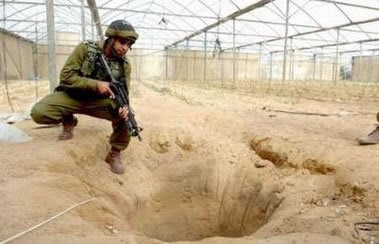בס״ד | ||
To the Nations of The World | A las naciones del mundo | |
We, the Jewish people, both in Eretz Yisrael and in the various places of our exile, hereby declare: | Nosotros, el Pueblo Judío, tanto en Eretz Israel como en los varios rincones de nuestro exilio, por lo presente declaramos: | |
1. That the Jewish People are the sole heirs to the Land of Israel, from the Jordan River to the Mediterranean Sea; | 1. Que el Pueblo Judío es el único heredero de la Tierra de Israel, desde el Río Jordán hasta el Mar Mediterráneo; | |
2. That all the Jewish people, each and every Jew, and only the Jews, have the right to return to the Land of Israel; | 2. Que todo el Pueblo Judío, todos y cada uno de los judíos, y solo los judíos, tienen el derecho a regresar a la Tierra de Israel; | |
3. That the Jewish People have the right and duty to settle the Land of Israel in its entirety, to work the land, to build industry on it, and to do so respecting its holiness as the Torah commands; | 3. Que el Pueblo Judío tiene el deber y el derecho a asentarse en toda la Tierra de Israel, a trabajar la tierra, a construir industria en ella, y a hacer esto respetando su santidad según comanda la Torá; | |
4. That any individual Jew, even with the claim of representing the Jewish people, the people and/or government of Israel, or any representative or ruling authority; has no right to give away the collective right of the Jewish people over the Land of Israel; | 4. Que cualquier individuo judío, incluso bajo la pretensión de representar al pueblo judío, al pueblo y/o gobierno de Israel, o a cualquier autoridad gobernante o representativa, no posee derecho a rendir el derecho colectivo de todo el Pueblo Judío sobre la Tierra de Israel; | |
5. That we will not accept any declaration, agreement, legislation, court ruling or decree that contradicts our right to the Land of Israel. This includes any instance where our right is only partially recognized, or where another people or entity alien to our people is said to share rights over the Land of Israel; | 5. Que no vamos a aceptar ninguna declaración, acuerdo, legislación, fallo de corte, o decreto que contradiga nuestro derecho a la Tierra de Israel. Esto Incluye cualquier instancia el la que nuestro derecho es solamente reconocido parcialmente, o en la que otro pueblo o entidad ajena a nuestro pueblo comparta susodicho derecho; | |
6. That the name of our land is the Land of Israel, ארץ ישראל, and that we do not recognize the sovereign validity of any name imposed by foreign conquerors, or any people called after such imposed name; | 6. Que el nombre de nuestra tierra es la Tierra de Israel, ארץ ישראל,y que no reconocemos la validez soberana de ningún nombre impuesto por conquistadores extranjeros, o de cualquier pueblo llamado con el nombre de tal impostura; | |
7. That the capital of the Land of Israel is the entire city of Jerusalem, and that this is an unconditional truth not subject to debate or negotiation. No other people or entity of any sort has sovereign rights over that city, and even the collection of all the nations of the world has no such right; | 7. Que la capital de la Tierra de Israel es Jerusalén, y que esto constituye una verdad incondicional que no está sujeta al debate o a la negociación. Ningún otro pueblo o entidad de cualquier tipo tiene derecho soberano sobre esa ciudad, e incluso la colección de todas las naciones carece de tal derecho; | |
8. That the Temple Mount is our most Holy place, and that no one has the right to violate its holiness and physical integrity. The remains of the First and Second Temple shall not be touched unless it is for the specific purpose of building the Third Temple; | 8. Que el Monte del Templo es nuestro lugar más santo, y que nadie tiene el derecho a violar su santidad y su integridad física. Los restos del Primer y del Segundo Templo no han de ser tocados a menos que sea por el propósito específico de la construcción del Tercer Templo; | |
9. That the State of Israel has the duty to keep the Land of Israel on Jewish hands, and any violation of this duty is to us of no validity. We do not recognize any territorial concession, and no peace may come from such thing. | 9. Que el Estado de Israel tiene el deber de mantener la Tierra de Israel en manos judías, y cualquier falta a este deber para nosotros carece de validez. No reconocemos ninguna concesión territorial, y ninguna paz resultaría de tal cosa. | |
Please comment on the above declaration. Your input is most appreciated to make this a serious and broadly accepted document. | Por favor comenten sobre la declaración de arriba. El aporte de ustedes será muy apreciado, y ayudará a hacer de esto un documento serio y de amplia aceptación. | |
Showing posts with label ארץ ישראל. Show all posts
Showing posts with label ארץ ישראל. Show all posts
Monday, November 26, 2007
First Draft Declaration of the Jewish People / Primer Borrador de la Declaracion del Pueblo Judío
Labels:
Declaracion,
declaration,
Jewish People,
Land of Israel,
pueblo judío,
Tierra de Israel,
ארץ ישראל
Thursday, January 04, 2007
Llover sobre mojado / Beating a Dead Horse
בס״ד
Labels:
Eretz Israel,
Eretz Yisrael,
Eretz Yisroel,
Gush Katif,
ארץ ישראל,
גוש קטיף,
היתנתקות
Subscribe to:
Posts (Atom)


